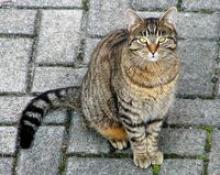But there are many older cats in need of adoption, and they can bond with you just as well as a younger kitten. Some cats have already been conditioned to get along with children, other cats or dogs, making training that much easier. Also, while we all know that cats are easier to potty-train than dogs, there’s the added benefit of older cats knowing how to take care of their business without you stepping in, too.
In fact, there are many benefits to getting an older cat rather than a youngster:
Older cats are often more well-behaved. Sure, you may have to invest in a good scratching post, but younger kittens with much more spunk are more libel to shred your toilet tissue and curtains.
Older cats are great for childless homes. If you want a sweet, lazy companion to lay around, purr at your feet and sit in your lap while you watch House, an older cat is just for you.
Older cats can be great for homes with children, too! Some older cats are used to being around children and are more tolerant of a child’s antics. Just be sure to ask during the adoption process. Plus, children can be very rough with kittens—sometimes even causing harm while not intending to do so. An older cat is likely to be more resilient—and to walk away when things start to go wrong!
Older cats are generally calmer. They normally won’t run under your feet as much as a kitten, and require less soothing when it comes to strange situations—such as guests coming over or a car ride.
Older cats require less care. Besides already being litter trained, they usually are neutered, have all of their shots and require simple annual checkups and shots to maintain their health.
Older cats are often declawed. Though some people are against declawing, people who prefer it may wish to adopt a cat who has already had the procedure done.
